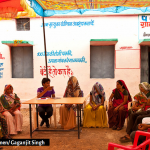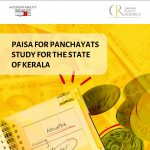
No Space at the Top
28 July 2016
It is nearing seven years since I quit the cozy confines of the bureaucracy and became a traveling salesperson of decentralisation and anti-corruption. I would be deluding myself if I did not admit that I have on occasions, reflected upon whether leaving was the right thing to do. The other day I spoke to a colleague in the government who poured out her heart to me. She wanted to leave, desperately, and told me how confining, corrupt and unfeeling the government had become. I advised her to stay. I heard myself give her the same reasons to stay on, which I had cheerfully disregarded when I left. ‘We need you there’, I said to her, ending my spiel, weakly and selfishly.
While there is plenty to be said for staying in the government and doing good things of everlasting benefit to people, from the perspective of nursing ambitions and fulfilling them, the last ten years in the higher bureaucracy are nerve wracking. The higher bureaucracy is full of intelligent people, who have gone through layers of tough competition to gain entry. Prior to cracking the entrance examinations, many of them over the years, have trained themselves to be single-minded in their pursuit of excellence, to compete and win. A collaborative spirit is not welcome in the training of such minds. Indeed, since selection is based on competitive examinations, collaboration is an anathema.
When a set of driven, competitive individuals gain entry to the stratosphere of the bureaucracy, it is too much to expect them to transform themselves into caring, sharing, collaborative teams overnight. Of course, if it suits them, they will passionately advocate team building, but there is an implicit precondition; that they will invariably head the teams that they build.
At the start of their careers, the implications of competition are not so readily apparent. There are plenty of jobs on offer at the lower levels for officers to excel. The initial years following recruitment into the Indian Administrative Services, for instance, follow nearly identical pathways in different States. Everybody starts off with a series of field postings, as sub-divisional magistrates, CEOs of District Panchayats, and that final summit from where they can lord over their empires, as District Collectors. While there is some element of comparison between these positions, it is hard to say that being District Collector of one district is not at par with the same position in another district. True, there are so called ‘prestigious’ districts – for example in Karnataka, being posted as the DC of Mysore is to be savoured more than being the DC of Bidar district; but then then the latter incumbent has the compensation of being the minor sultan of a far flung outpost to console herself.
It is after those first fifteen years, that the field narrows down. The general public, accustomed to seeing all officers as exalted might not discern the difference; everybody is up in their snowy peaks. However, for the insider, the difference between a good post and a bad post, between a side-lined position and a mainstream, plum posting, is stark. If one is pushed to a position of relative unimportance, the effect can be as good as being punished.
How are these hierarchies and inequalities recognised and maintained? There are many ways, which only the insider knows.
In Delhi, an individual knowledgeable of the caste hierarchy of the Union Government’s bureaucracy enlightened me of the criteria used to position officers in social gatherings. ‘Who you are, in Delhi’, he said, ‘depends upon five things; the Ministry in which you work, the colony in which you live, the school to which your children go, the club where you have membership and the breed of your dog’.
By those yardsticks, I reckoned, I lived in the basement of the rankings. I was Joint Secretary in the Ministry of Panchayati Raj, which ranked low in the pecking order of social sector ministries, particularly when compared with the more prosperous and self-important ministry of Rural Development. I lived in a colony that was centrally located, but in a house that was two levels below the category to which I was entitled. My son did not study in Delhi, so I got zero marks in the school criterion. I did not belong to any club, since, like Groucho Marx, I would not join any club that would deign to admit me. And my dog, bless the rascal, was a Road-Island Retriever, which came off an island on the road. If I looked hard at his silly face, I might recognise a shade of Labrador, but that would be cheating.





